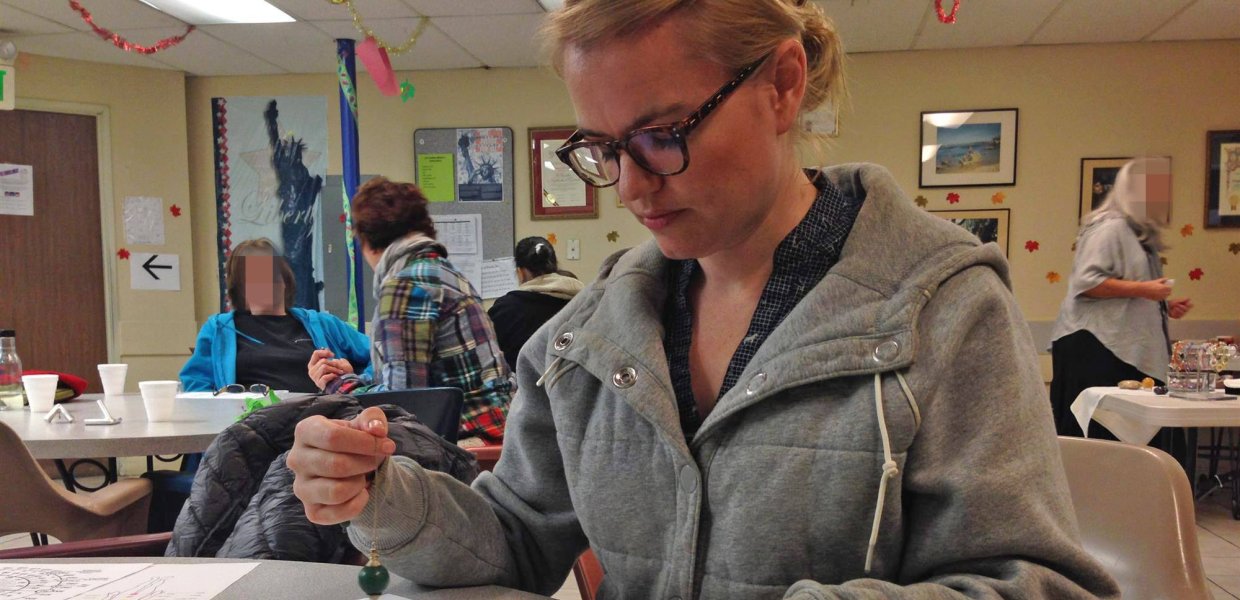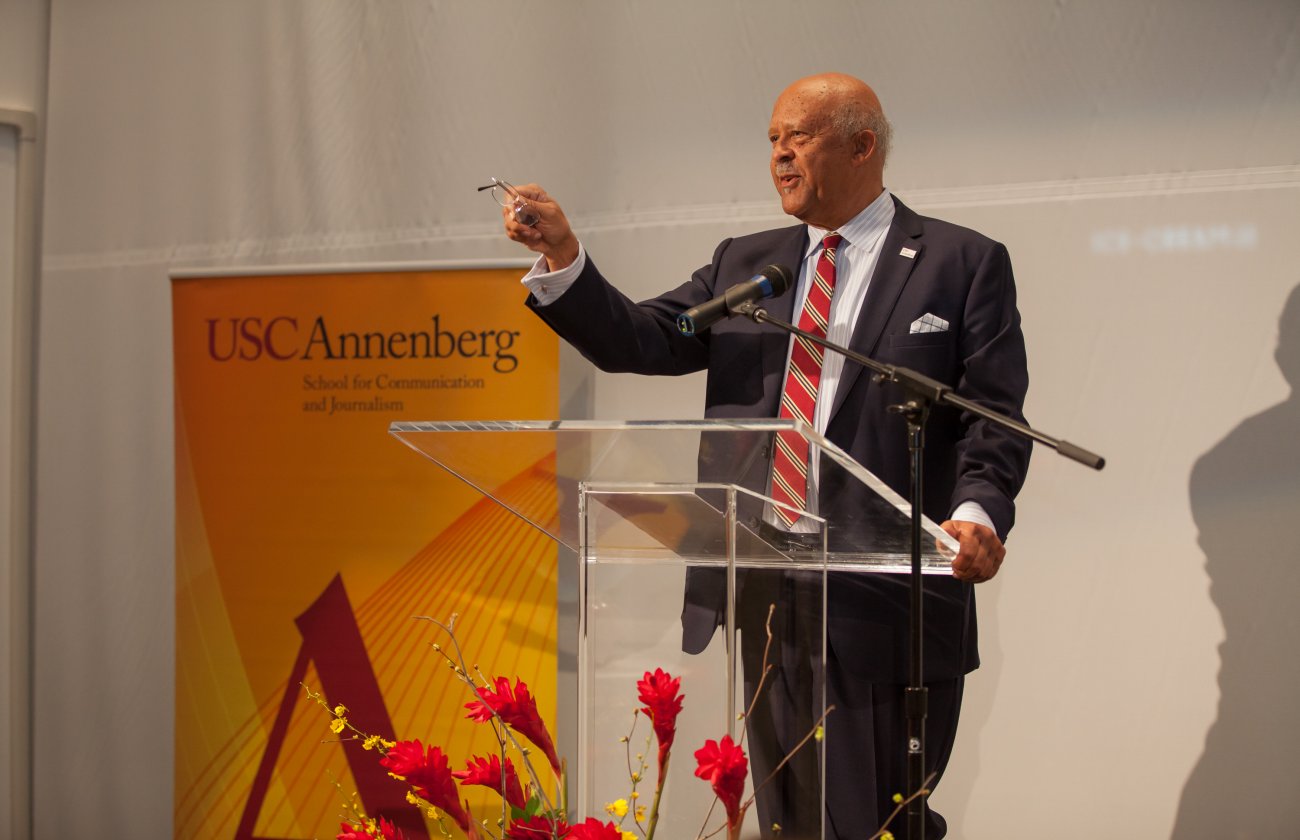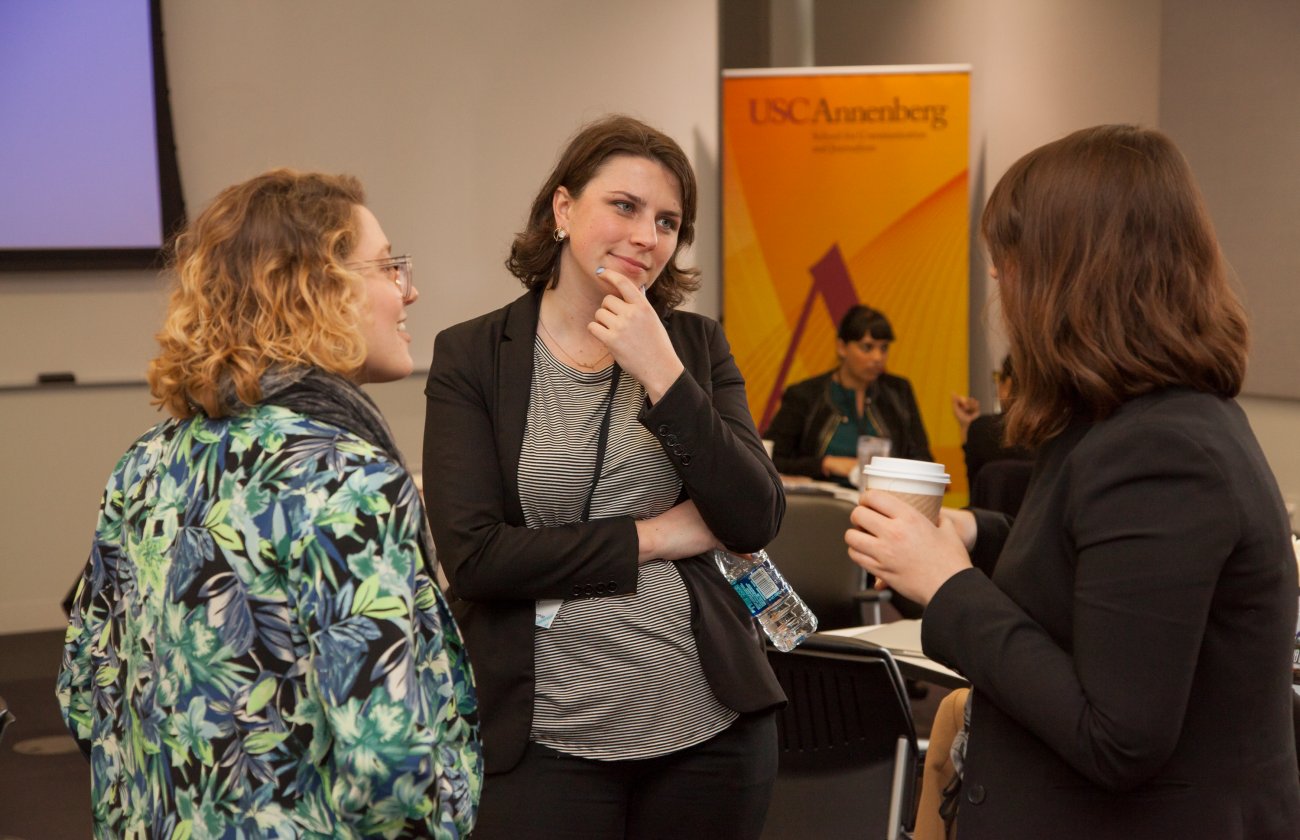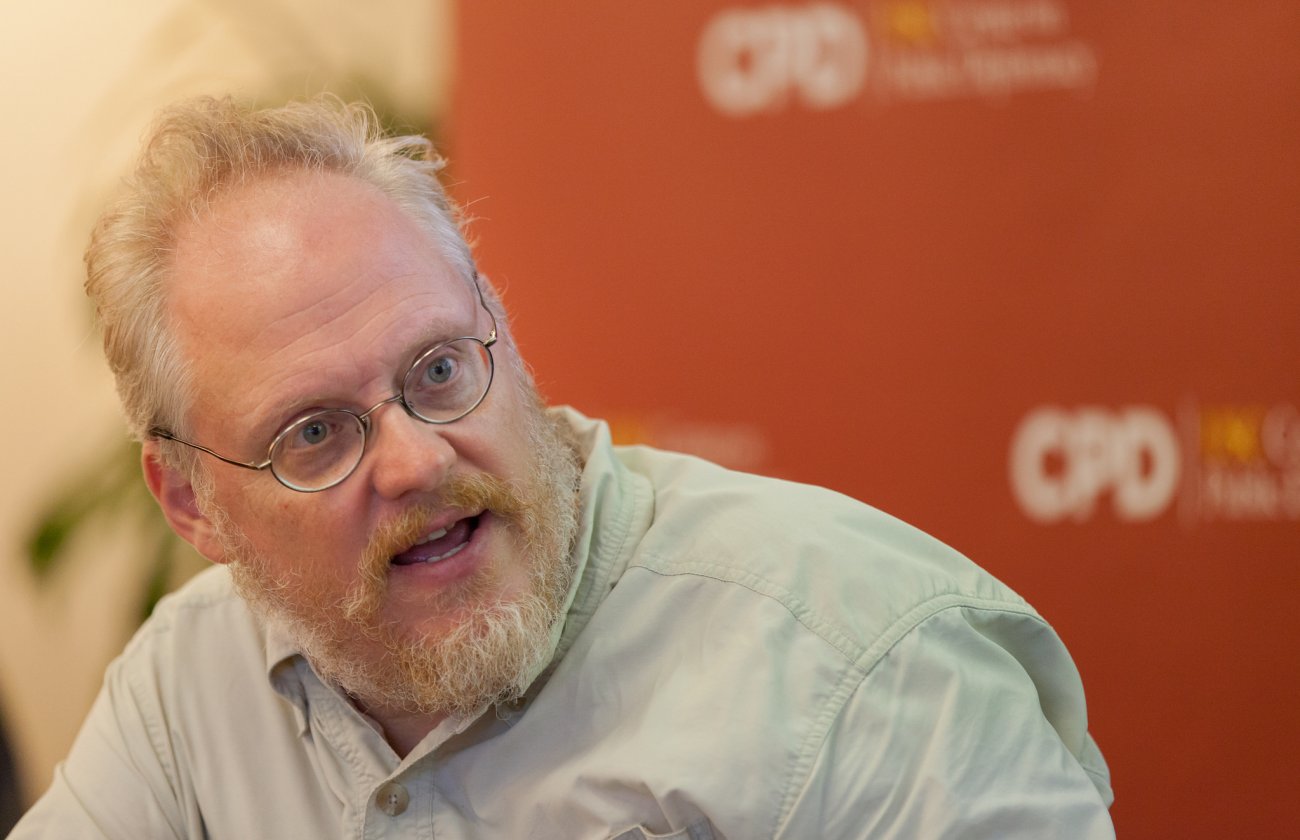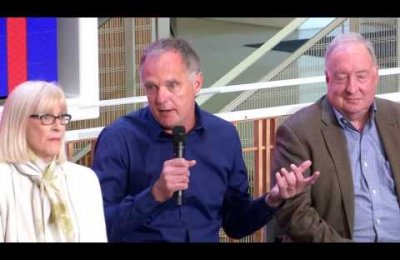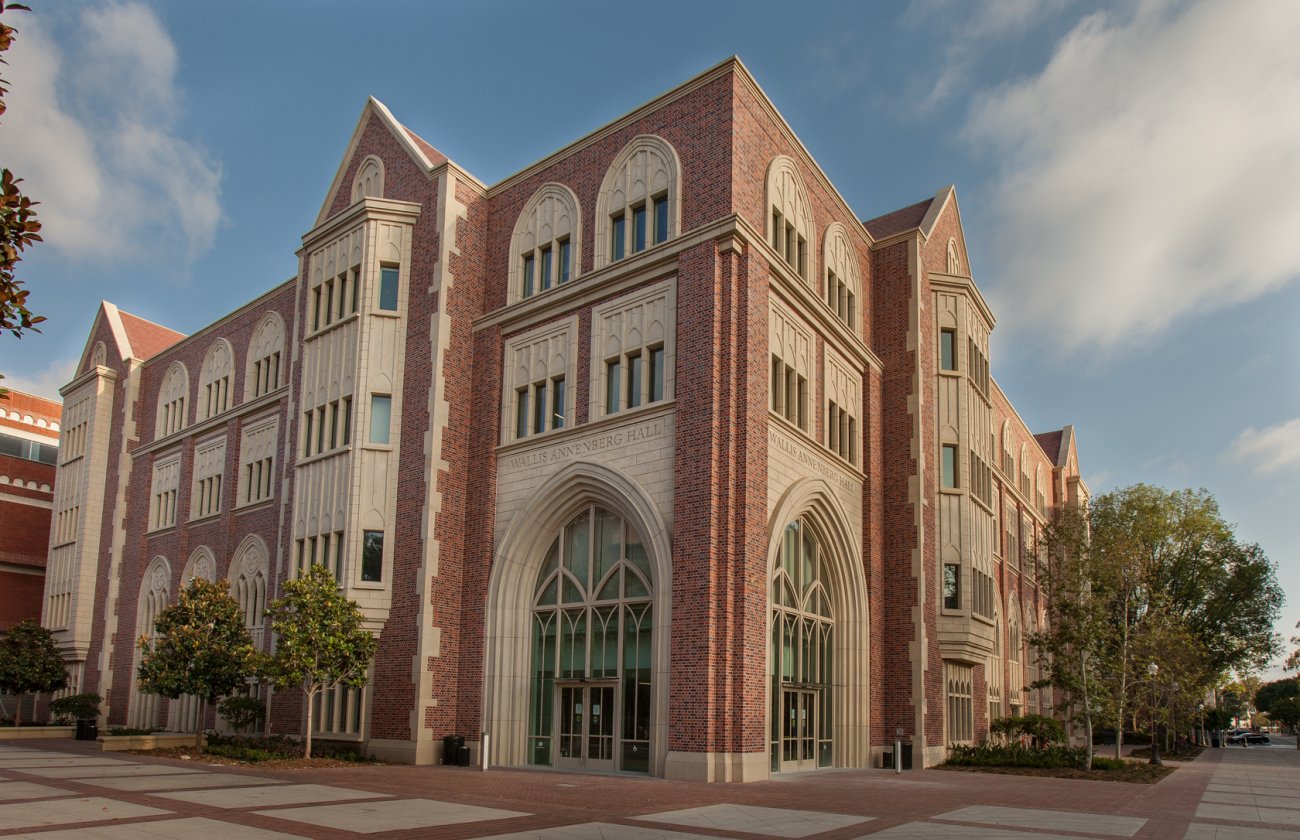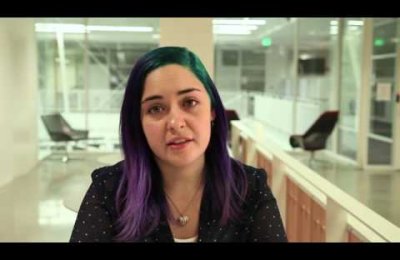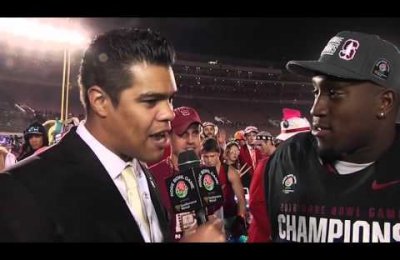
Her piece, “Stalked: My Confusing Journey Through the Complex Process of Getting a Restraining Order,” was inspired by her own encounter with a stalker.
Last year, a man walked into Poppy’s apartment, claiming someone was trying to kill him. Poppy quickly realized he was lying, called the police and he was arrested. But, the man — whom she refers to as Mason in her story — kept showing up in her life.
Poppy filed for a restraining order against Mason and was granted a temporary one almost immediately. But the process of obtaining a long-term order proved more difficult than Poppy, and others like her, had anticipated.
“As she went through this ordeal, it quickly became apparent that the system is just broken. The more we talked about it, the more we realized that it must be failing women from every walk of life,” Vince Gonzales, director of USC Annenberg’s Journalism M.S. program, said of consulting Poppy on her project topic.
The USC Annenberg professors and advisors Poppy worked with were instrumental in fleshing out her topic and finalizing the piece, she said.
“They helped me figure out how to take my individual story and figure out what parts were universal, that other people would want to know about, and how I could investigate those elements,” Poppy added.
Poppy, who has a bachelor’s degree in acting from the University of the Pacific and graduated from the Groundlings Professional School of Improvisation in 2013, said her background in comedy is a big part of why she was able to discuss her personal life so openly.
She also felt like it was important to share her story because others like hers often “get so shrouded because people are ashamed or feel vulnerable when they share them.”
“If someone is going to read it and be like, ‘She went through this, she got through this, here’s how she did it,’ then that’s worth it,” she added.
“To her credit, [Poppy] approached this situation as a citizen in need and as a reporter,” Gonzales said of Poppy’s work. “She did research, kept precise notes, and continued to update the story even after her project was done. I'm not surprised VICE decided it was a story they wanted to publish.”
VICE will also be publishing several other articles of hers soon, Poppy said.
Her latest endeavor, however, is finding a publisher for her book, “When We Are Together,” which investigates different religions and fringe groups, as well as the reasons people join them.
“This book is the story of those groups and their members. It is also my story. It’s why I joined, why I left, and why I keep going back,” Poppy wrote on the book’s website.
When Poppy was in seventh grade, she became an Evangelical Christian. She went to church camp and “just fell for it, hook, line and sinker,” she recalled.
Then in her mid-twenties, she left the Church. While her experience in the Church was entirely positive, Poppy said she realized that she didn’t really believe in the teachings. Around this time, it also occurred to her that other people might be feeling the same way.
“They’re getting something wonderful out of their religion or their tiny fringe group, regardless of whether they think the claims are true,” Poppy observed, adding that she feels the practice of religion and spirituality is “one of the most fascinating things that humans do.”
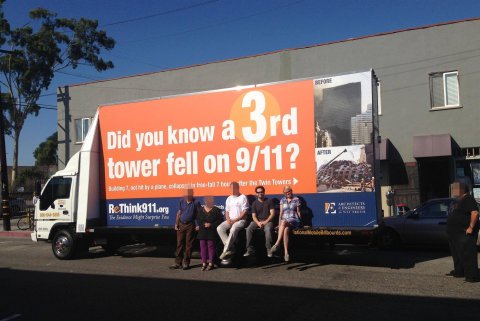
They then began discussing their experiences on a podcast called “Oh No, Ross and Carrie,” which has since become the number one spirituality podcast on iTunes.
Poppy pointed out that their reporting methods are unusual because they do not identify themselves as reporters when they begin an investigation.
“Since a lot of these groups are secretive, we felt that telling them upfront that we were reporters would really change things,” Poppy said, noting that other reporters have gotten turned away or directed to a publicist.
Poppy used material from the podcast, as well as additional academic research, to produce a sample of the book for JOUR 598: Journalism Capstone Project at USC Annenberg. She wrote 10,000 words — the first three chapters — of her book, a formal proposal and put together a marketing website.
She is currently looking into other fringe groups, though she couldn’t divulge which ones.
Listen to Poppy read the foreword from "When We Are Together":
Listen to her read several other chapters here.
Read an excerpt from chapter two, entitled "My UFO Baptism," below:
When the aliens steer their ship over the red rock deserts of Nevada, I am ready. I am wearing all white, I’ve been praying all morning, and I’ve signed my contract stating that I disavow all my previous religious beliefs. Ricky, one of the leaders of the American Raëlian movement, smiles at me and calls my name. We only have a few minutes to transmit my DNA to the spaceship overhead. The Elohim, our alien creators, are always hovering over us, but only four times a year do they come close enough to Earth that they can receive the cellular transmission we’re sending up now: the molecules that code my DNA and make me distinctly me. Once the Elohim have stored this genetic footprint in their master computer, they can clone me again and again. I will be immortal, even if I won’t experience it.
The Raëlians call this process a “demystified baptism.” The “demystified” implies that the process is scientific more than it is spiritual while, paradoxically, “baptism” indicates that this act has eternal and moral consequences. Like many religions, Raëlism teaches that baptism is critical for salvation. But when they say they are “saved,” they mean saved like a document on a computer. They are, literally, saved rather than at risk of being erased.
Ricky is teaching a younger leader to perform the ceremony, so he motions him over to give me my transmission. The younger Raëlian nervously looks from me to Ricky, Ricky to me, waiting for a nonverbal cue. Screw up the timing, and my DNA, and thus my salvation, are on the line. Ricky nods at him.
He cups some water into his hand, slaps it against my forehead, closes his eyes and prays. It is done. My DNA has been uploaded to the computer in the sky. In more than one way, I am saved.
My friend, Ross, who is also being baptized, is called next. Ricky baptizes him directly, pressing water to his forehead. The water helps to activate our transmitters and our hair act as “antennae,” helping to make the message ever stronger. I look around. A few Raëlians are bald. Hopefully, they got their baptisms earlier in life.
When the ceremonies are over, we take a group picture. The group is quite diverse: at least four continents are represented in our small group. There are several people who have come from France, a few more from Denmark and Canada, visitors from Japan and Brazil. Raël’s message has been especially popular with Asian-Americans, who are well-represented today.
Many of the women are in short, tight dresses; Raëlism encourages sexual freedom, and it’s common to see women flashing their breasts at men during ceremonies, or two to four people making out during a talk. There are no children here, and I have never seen them at any Raëlian meeting. It certainly doesn’t seem like a family-friendly atmosphere, but perhaps the real reason no children come around is that Raëlians really don’t need to have children to feel like they’ve passed on their genes. Their genes are transmitted into the sky from red rock mountaintops, like mine just were.
I’ve been going to Raëlian meetings for five months at this point, and most people fit a certain demographic: thirty or older, middle to upper class, and free-loving spiritual types. They’re also remarkably physically fit compared to their average American counterparts. Many of them are vegetarians, though this isn’t a demand of the Raëlian faith, and their meetings are often peppered with healthy snacks, like hummus and carrots, or snap peas and Indian curry. They share with me and Ross without expecting anything in return, and we begin to show up with food just in case, so we won’t look like welchers.
Most of the meetings are held at a member’s house in the beachside town of Santa Monica. The first ten to thirty minutes are spent in open-eyed meditation, which is at first an uncomfortable experience. At our first meeting, we enter, sit down among the group, and watch as all ten people look from one person to another, smiling sublimely and saying nothing. Like the silence of a library, the emptiness of the room commands us to keep quiet, so we smile at everyone, unsure what is happening. One man nods at me, effusively, as if validating what I’m doing.
“I’m doing it right!” I think. Yes, I am sitting quietly just right.
After thirty minutes of this, Allison, the regional leader, speaks.
“Monica should be here any minute,” she says.
“Who’s Monica?” I ask.
“You’re in her house,” she says.
“Oh!” I look at the others, suddenly aware that we have been sitting in someone else’s apartment all this time, smiling at each other, like burglars who have taken psilocybin halfway through the act, and forgotten why they’re there.
“I think we can start,” says Jacob, and we do.
Starting means waiting for someone to share the first thought in their head, and the first thought comes from a man named Michael, who sits cross-legged on a papazan chair across from me.
“Everything comes from energy, from thought,” he says. “I was reading about some new research that shows that sickness comes from stress.”
Everyone nods, emphatically. All sickness comes from stress. Yes!
“Take, for example, ulcers. It’s a manifestation of stress.”
“I think there’s some disagreement about that,” I say. “I believe it’s mostly bacteria.” Everyone looks at me, the killjoy who has invaded their space with my bafflement at extended silences and my pedantic ulcer comments.
“…but I’m sure the stress doesn’t help,” I offer. They nod, and look away. Allison’s eyes linger on me, appraising me. I’ve definitely gotten off on the wrong foot. So I overcompensate.
“Yes! YES! Stress!” I say. “Stress is very bad.”
Ross is looking at me, perplexed. Why am I now going on about stress? Everyone knows stress is bad, no one has suggested otherwise, but I’m announcing it as if it’s the most important discovery of the early 2000s.
“Yeah,” Michael says. “Anyway, it all comes back to negativity. If you stress yourself out, and convince yourself that things are bad, well then, they will be. And your body will act accordingly.”
They all nod, and begin listing ailments that might be caused by stress. Insomnia! Anxiety! Acid reflux! Headaches! Cancer!
“Wait,” I interject, “Cancer?”
“Yes! There was just a study on this, is what I was saying,” says Michael, glad that I am finally catching onto the central point.
“Oh!” I say, “Wow. I’d love to see that. I mean… what about genetics, then? We inherit some genetic risk for things like cancer, don’t we? My mom had cancer, and I have genes that put me at high risk for it, too. I assume I got them from her….”
“Yes, but you can’t activate them if your body and mind are healthy,” explains Michael, his tone reflecting his patience.
“Oh,” I say, “I see.”
It’s become rather late at this point. Staring and talking about cancer has given me quite an appetite, and I keep eyeing the untouched food on the table. The conversation has turned to an upcoming event, but I have missed the segue, temporarily lured by non-GMO potato chips.
“I do hope you’ll all come,” says Allison. “The Happiness Academy is our biggest event of the year.”
The Happiness Academy, I learn, is an annual conference in Las Vegas. On the official Raëlian website, it says “Raëlian seminars are the only place in the world where one can receive the user manual for one’s life.”
Given Raëlian belief structure, this is plausible. Raëlians believe that their leader, Claude Vorilhon, has been uniquely chosen as the messenger to deliver the Elohim’s lessons to humanity, including our creation in the petri dishes of Elohim laboratories. Vorilhon learned this on a mountaintop in France in 1973, when aliens landed, invited him on their spaceship, and spent three days teaching him about the meaning of life. Vorilhon, he learned, had been uniquely chosen to deliver the Elohim’s message to humanity. He was the Chosen One.
Vorilhon was instructed to tell the world that everyone had been created in a great science experiment conducted by alien scientists. He learned that human gender is a construct, and that sexuality should be fluid and inclusive; free love is the ideal. He learned that science is one of humanity’s greatest ideals, that too many religions fear it, and that he should sing its praises, as it is the motivating force of our creators. Science, they said, will one day enable human cloning, one of the most important steps humanity can take toward eternal life. After all, if we can clone ourselves over and over, we can, in a sense, live forever. Most importantly, he was instructed to build an embassy so that aliens could touch down on Earth and greet us when humanity is ready.
As the number of Raël’s followers grew, the extraterrestrials continued meeting with and talking to him, getting ever more pointed in their requests and how they might benefit Raël himself: At first the message was something like “Love one another.” Over time, it turned into something more like “Love one another, but especially love Raël.”
When he came down the mountain, Vorilhon had changed his name to Raël, and soon thereafter began the movement that would become Raëlism, the largest UFO-based religion in the world.
I don’t know what to expect from the Happiness Academy, with all of this new, unworldly information floating around in my head. I find myself in the awkward position of asking questions that might be insulting to the average person, but seem important.
“Do people wear clothes?” I ask.
“Yes, of course,” they snicker.
“And the free love…” I ask, trailing off.
“It’s there if you want it,” they say.
“I have work, so I can only be there over the weekend,” I say, weakly.
“You will miss some of the best stuff,” Meg says, smiling conspiratorily at her friends, “but it’s still worth it.”
I sign up.
